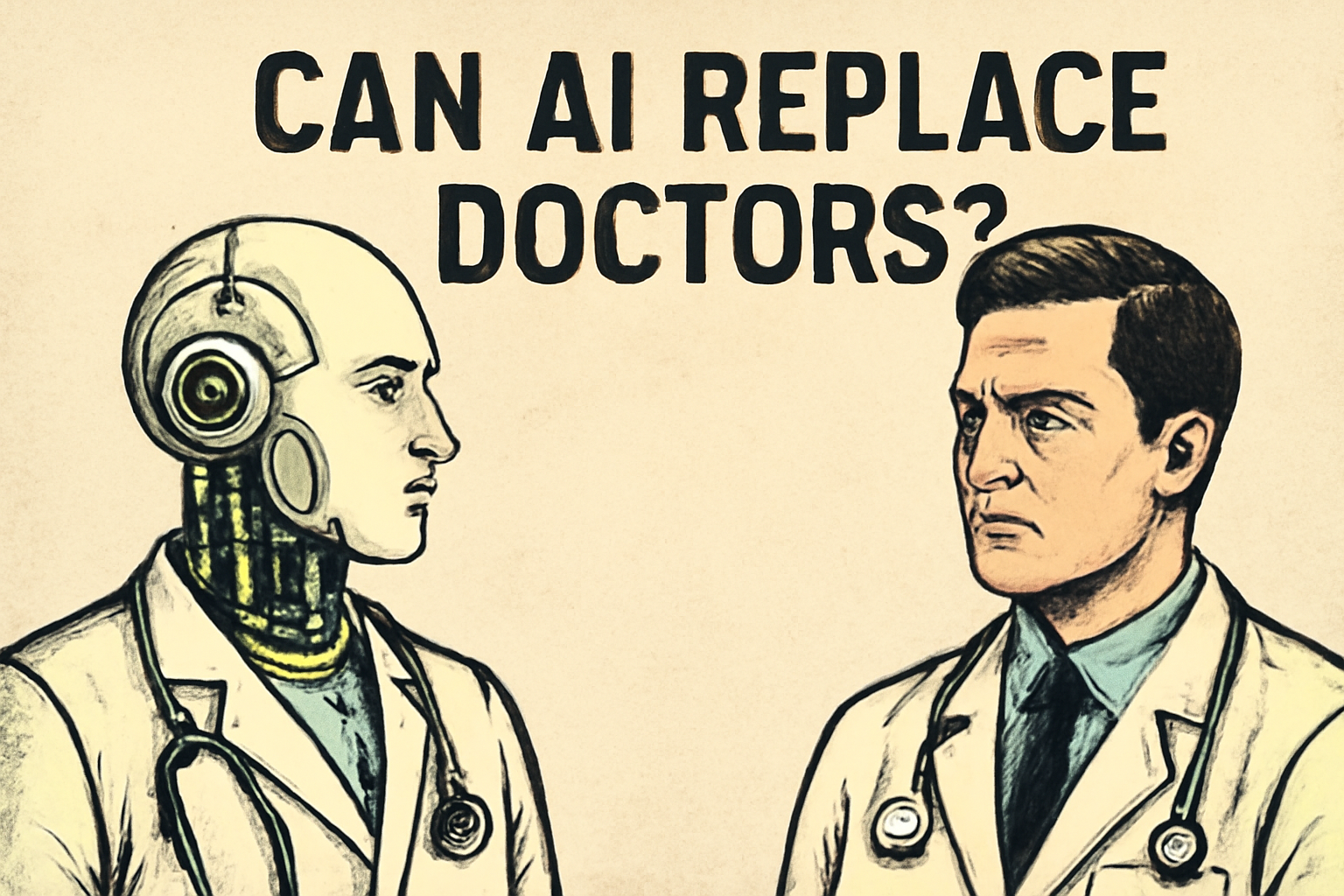Introduction: The Big Question in Health Tech
The question “Can AI replace doctors?” is being asked with increasing urgency in clinics, boardrooms, and global health forums. With advanced algorithms detecting illnesses from scans or predicting treatment responses, the idea that AI might one day take over some doctorly roles sounds plausible. Yet most research suggests a different, more nuanced future—one of collaboration rather than replacement. In this article, we’ll explore what AI can do in medicine today, what it cannot yet handle, why complete replacement is unlikely, and how physicians and AI are likely to work together in the years ahead.
1. What AI Can Already Handle in Medicine
AI in healthcare is no longer sci-fi—it’s real and growing. It performs tasks that complement doctors, often behind the scenes.
- Diagnostic support and imaging: AI tools can analyse scans (X-rays, MRIs, CTs) quickly and often with high accuracy. Keragon+1
- Workflow and administrative automation: From transcribing physician notes to scheduling and coding, AI relieves doctors of non-clinical burden. Keck Medicine of USC
- Predictive analytics and personalized treatment: AI can integrate large datasets to flag risks, suggest therapies, or monitor patient progress. postgraduateeducation.hms.harvard.edu
These use-cases show AI enhancing efficiency and decision-making, not replacing doctors outright.
2. What AI Cannot (Yet) Do—and Why That Matters
Despite its strengths, AI has limits. Here are some key areas where human doctors still lead.
- Empathy, ethics and patient context: The physician-patient relationship often hinges on emotional intelligence, shared decision-making, and understanding a patient’s life context—areas where AI struggles. The Medical Futurist+1
- Complex judgement in novel situations: Medicine often involves ambiguous cases, rare diseases, or ethical dilemmas. AI trained on past data may falter when facing something unprecedented. PMC
- Accountability and trust: Who takes responsibility if AI misdiagnoses? Who patients trust? These are major barriers in deploying fully autonomous medical AI. SpringerLink
Given these gaps, full replacement of doctors by AI remains unlikely in the near to mid-term.
3. Why “Replace” Might Be the Wrong Word
A growing consensus among experts argues that AI should augment doctors rather than replace them.
- Collaboration over substitution: Many studies emphasize “human-in-the-loop” models, where AI handles data-intensive tasks and doctors provide oversight and contextual judgement. PMC
- Task redefinition, not job elimination: Instead of eliminating physicians, AI is more likely to change what they do—shifting focus away from routine tasks toward more strategic, patient-centred care. The Medical Futurist
- Global shortages and access: In many regions, the alternative to AI is no doctor at all. There, AI may not replace doctors—it may provide them. SpringerLink
4. Challenges That Must Be Navigated
For AI and doctors to work together effectively, key challenges remain:
- Data bias and representation: AI trained on narrow populations may mis-diagnose underrepresented groups. Ensuring equity and fairness is critical. Keck Medicine of USC
- Explainability and trust: “Black box” AI decisions make it hard for clinicians (and patients) to understand and trust the reasoning behind diagnoses. PMC
- Regulation, liability and ethics: As AI takes on more clinical roles, governing its use—who’s liable, how data is used, how outcomes are validated—becomes central.
- Integration in workflows: AI may offer insights, but if it doesn’t fit into how doctors work, it won’t be used—or it may cause disruptions.
5. What the Future Might Look Like
What happens if the collaboration model wins?
- Enhanced clinicians: Doctors augmented with AI will handle more patients, make more accurate diagnoses, and spend more time on human-centric care.
- New roles and skills: Physicians may become “AI-enabled doctors” or work alongside digital health specialists, interpreting AI outputs and guiding patient care.
- Global reach and access: In underserved settings, AI diagnostic tools may expand access to care until human doctors are available.
- Ethics built into systems: The next generation of AI will embed frameworks for privacy, fairness and transparency from the ground up.
Conclusion: The Doctor + AI Team, Not Doctor vs AI
In the debate over whether AI will replace doctors, the answer today is clear: AI will not fully replace doctors—but physicians who embrace and integrate AI may outperform those who don’t. The future of healthcare lies in a partnership between human empathy and machine intelligence. As AI becomes better, faster and more capable, the human touch remains irreplaceable—making collaboration, not competition, the key to thriving in the medical world of tomorrow.
To learn more about AI enroll to https://training.chimpvine.com/

